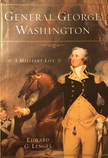
Washington expressed his discontent many times. He was constantly training new recruits in military etiquette and responsibility, and in December of 1776, he had finally had enough. The commander-in-chief requested unprecedented authority. He wanted to circumvent all political oversight; wrote Edward Lengel, "displacing Congress as the supreme arbiter of both military and civilian affairs within his army's zone of operations. This man, who led and fought to be out from under the oppressive tyranny of England's crown, asked for unlimited power. And on December 12, Congress gave him "full power to order and direct all things relative to the department, and to the operations of war" until such authority was revoked.
He insisted that he was not power hungry. He was only backed up by acquaintances and friends because Washington had established such a high reputation for trustworthiness. One such wrote to John Hancock, president of the Second Continental Congress, "...I can assure you that the General will not exceed his Powers altho' he may sacrifice the Cause. There never was a man who might be more safely trusted nor a Time when there was a louder Call."
The general also wanted jurisdiction to prosecute and punish anyone who appeared "especially dangerous". Opines, Lengel in General George Washington, "Loosely interpreted, it could give Washington dominion over every man in America." Just as in every generation, we often worry about our leaders piling up too much authority and power, turning into a dictator state. It was exactly what the united colonies were trying to escape.
If wouldn't work with anyone lacking time-proven trust. Oft times, leaders lust for power to the point that they will run over people to get it. Once in hand, they abuse it. That makes Washington's request and Congress' permission a dangerous precedence. If Washington could have such authority, what keeps others from citing such as a reason to do the same?
This, too, has application in the fourth grade. I don't normally assign roles for students when they work in their groups (We don't have time keepers, notetakers, etc.); I like to see natural leadership take shape instead. Sometimes that's a double-edged sword, but it's interesting to watch students test the waters of leadership and figure out how to bring others along with them, rather than leave others on the side of the river to perish. There are these things to consider:
- How much can a person assert himself without pushing other people over the edge? In other words, how does one "lead the sheep" without "driving the herd"?
- Does one person require a different leadership strategy from another person? How does the leader manage such?
- A teacher must consider the same types of questions. How much authority can a teacher give to a student without showing favoritism?
- A teacher must be cognizant of the authority granted to her in the classroom. How much autonomy is a principal of other administrator willing to grant?
- Trust is something that must be earned over time. True trust is not given until one is worthy of it. Now do you get the meaning of the word?
May we all see to be accepted as being worthy of the trust of our peers, those in authority over us, and those who see us as adversaries!







































